Hope In Isolation

MORE STORIES FROM LUNG CANCER PATIENTS AND CAREGIVERS DURING COVID-19
Candace Skrapek
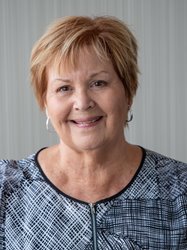
The global COVID-19 pandemic has been unsettling for everyone and we have all been impacted by the emergency public health responses put in place to keep citizens safe and support the health system to be able to respond effectively. Those of us who are lung cancer survivors have additional risks that create anxiety and stress. My family has been mindful of the necessary restrictions but looks forward to opportunities to gather together once again. I miss hugging my grandchildren! The newly developed resource, COVID-19 Cancer Patient Support Hub, provides a wealth of reliable information for cancer patients and their families.
To read Candace's full story click here.
Dobie Lewis
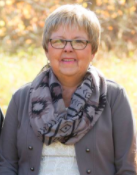
As a result of the COVID-19 pandemic, a scheduled CT scan in March was cancelled. I was worried because it was at the 3-month mark and there was no way to know if the treatment was working. Luckily, my doctor was able to call and ensure that I got the scan done. I worry whether I would get priority treatment if I had to be admitted and there was a lack of bed space.
To read Dobie's full story click here.
Patricia O'Connor
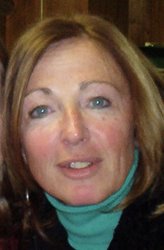
My journey started in the fall of 2019, in November, when we discovered that I had lung cancer. It was a bit of a surprise to all of us because there was no indication that there was anything wrong, to then finding out that I had stage 4-lung cancer. It was a bit of a frightening time.
After a Gamma knife procedure at the hospital, as a precaution my doctor suggested I get tested for COVID-19, and we were surprised a day later to hear that I was positive. Getting COVID was definitely a shock. I thought, on top of everything I was going through could one more thing go wrong, and in my case that is exactly what happened.
To read Patricia's full story, click here
Elaine Stewart
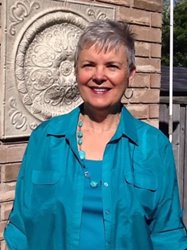
COVID-19 brought us one of the scarier times in my husband’s journey. He had a retinal stroke on April 1st and we ended up back at the Juravinski Hospital emergency room. I am the one who has all the medical information, but could not go with him due to the pandemic. I had to wait in the car from 4:30 – 10:00 pm. My husband was eventually admitted into a ward room with three other people. No one was wearing PPE, not the doctors, nurses, cleaning staff or food service providers. All of these people were moving in and out of the room with no protection. Having really only one lung and being 80 years old, he was at very high risk to get the COVID-19 virus.
I wondered, Why was he admitted? Why was he not worked up as an outpatient? Why was he not on the cancer ward? Why was he not in a private room? Why was he not given a script for a blood thinner and sent home? Again, we experienced a total discard for his cancer by ER doctors.
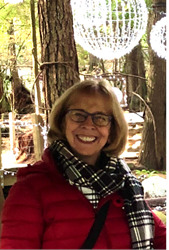 The pandemic has been very troubling for many people in the cancer world. You are social distancing, washing your hands, being kept away from people who mean the most.
For many cancer patients the beginning of the pandemic has been a bit like every other day: the constant googling looking for answers. The new normal as its called. I feel that as cancer survivors we are experts in adapting to what life throws at us. I have had appointments cancelled and have had some rescheduled. Unfortunately, I still have had to go to the hospital for some tests. Its not easy now going to hospitals, you do it alone, you are masked and it’s a whole new world once you are in. I have cancer friends who went for treatments only to get a call the next day, that her technician proved positive for Covid. That is difficult to hear when you are immune compromised. There is still so much unknown.
The pandemic has been very troubling for many people in the cancer world. You are social distancing, washing your hands, being kept away from people who mean the most.
For many cancer patients the beginning of the pandemic has been a bit like every other day: the constant googling looking for answers. The new normal as its called. I feel that as cancer survivors we are experts in adapting to what life throws at us. I have had appointments cancelled and have had some rescheduled. Unfortunately, I still have had to go to the hospital for some tests. Its not easy now going to hospitals, you do it alone, you are masked and it’s a whole new world once you are in. I have cancer friends who went for treatments only to get a call the next day, that her technician proved positive for Covid. That is difficult to hear when you are immune compromised. There is still so much unknown.
To read Carolanne's full story, click here.
Andrea Redway
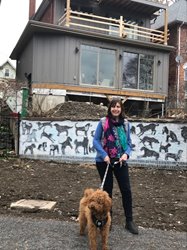
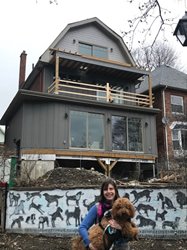
Later this month I will be celebrating the 5 year anniversary of my diagnosis with Stage 4 lung cancer in May 2015. It may sound strange to say that it will be a celebration, but for me, it will truly be a time of joy in the midst of this surreal pandemic.
The first year after my diagnosis was extremely rough – in addition to a 6 cm tumour in my left lower lobe, cancer had spread to my brain, bones, adrenal glands and there were early signs on my colon. I also had a blood clot pressing on my pulmonary vein. It was blindsiding for my husband and I and our two children, who were 8 and 11 years old at the time. After six weeks of chemotherapy and some radiation for my hip bone, I was only having a partial response and was feeling worse and worse. Luckily, some promising clinical trial results had just been published on a new treatment for advanced lung cancer: immunotherapy. I managed to have one dose of immunotherapy before I had to have emergency surgery for a perforated bowel. After a few weeks of recovering from that further setback, I was able to continue the immunotherapy treatments. About 8 months later, scans revealed that the cancer outside my lungs was gone and my primary tumour had shrunk to almost half its original size.
I was on immunotherapy for two years and continued to improve. In September 2017, my oncologist and I decided to stop my treatments based on the available research and because I had experienced a lot of difficult side effects. More than two and a half years after stopping treatment, I continue to be stable and feel well. I have a lot to celebrate.
In the first 2 or 3 years after my diagnosis, I found it very difficult to plan anything more than a few months ahead. The future seemed so uncertain. We had some great family adventures during that time – New York City, Tofino and the Gulf Islands, Nova Scotia and Newfoundland, Belize – but anything more than a few months away felt too uncertain. Over time, those feelings have eased and I now feel more confident in the future. Life always carries some uncertainty, but my focus now is on hope. This has led to a couple of changes in my life that I would not have thought possible 3 or 4 years ago. The first was getting a family puppy last year – a mini golden doodle named “Lu”. He has brought a lot of joy into our lives and is a saviour during this COVID-19 crisis as he loves to cuddle and gets all of us out for walks on a regular basis.
The second was that my husband Michael and I had the confidence to buy a new house. The house was built in 1905 and had not ever been updated, so last year we launched into a full overhaul renovation. Little did we know how fortunate we would be to move into our new home just a couple of weeks before much of the world went into the pandemic “lockdown”. For us, there has been lots of time to unpack, enjoy our new space and count our blessings. Being hopeful and trying to see a future beyond the next few weeks and months has made a real difference for me. It takes time, but it is possible to get there.
I look forward to celebrating many more milestones as a family in our new home, pandemic or no pandemic. Hope is what keeps me going and a pandemic cannot change that as I have much to be grateful for and a future to embrace.
Lorne and Mary Cochrane
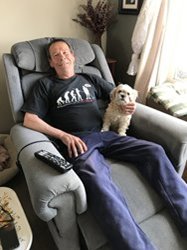
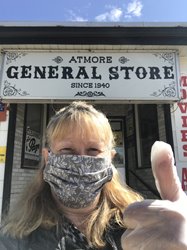
Lorne Cochrane is 60 years old and no stranger to the ravages of lung cancer. The disease claimed the life of so many who were close to him. His grandfather. His mother and father, two of his aunts, and his twin brother.
Despite having no symptoms, upon screening Lorne was diagnosed with stage 4 lung cancer. To his shock and dismay, the disease had spread from both lungs, to the adrenal gland, kidney, and pancreas. He was given 12-13 months to live.
After chemotherapy, he was accepted into a clinical trial that changed the way the medical community looked at treating lung cancer. After 9 weeks on treatment, Lorne’s tumours showed a major reduction in size. This was incredibly promising for Lorne, his family and the researchers following his journey. Eventually, the tumours were un-measurable and the prognosis he had initially received disappeared.
Now during the COVID-19 pandemic, Lorne and I are very concerned about how this situation is affecting our family. We have had to take extra precautions using a mask and gloves when going out to get groceries, making sure things are wiped down and everything is sterilized. Some of our new activities include social distancing from family and friends by making sure we stay six feet apart. Lorne does struggle with anxieties about what would happen to him if he does get infected with this virus and worries about whether or not to take the 2 1/2 hour drive to the Cross Cancer Institute to have his next CT scan appointment.
Our hope during this pandemic is that the world community will come together and come up with a vaccine in record time for COVID-19, and prove that with collaboration and working together, we can also find a cure for Lung Cancer!
To read Lorne's full story click here.
MaryAnn Bradley
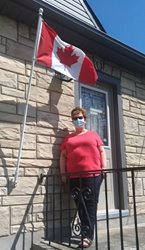
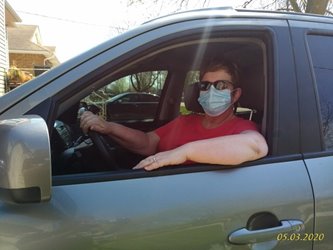
In October 2014, I was given the worst diagnosis anyone could ever get and those words still are echoing in my brain “you have Lung Cancer”. In the Cancer world, I am considered one of the lucky ones, although I still don’t see how any diagnosis of cancer can be considered lucky. However, I was able to have an upper right lung lobectomy and since then I have been Cancer free.
My advocacy for Lung Cancer started in 2015. I wanted to find out all I could about Lung Cancer and at that time, there was little or no information in Canada. I made it my goal to find out more and was able to connect with Lung Cancer Canada and to this day, I have found them to be a great resource for my advocacy work.
In early March 2020, the world was exposed to COVID-19, an unknown virus that is spreading across the world at a rapid rate. I was again hit with the same dread that I felt when diagnosed with Lung Cancer. The news of this virus has been very overwhelming. Everyday we hear of something new and a virus that we really don’t know too much about is affecting more and more people. COVID-19 affects the respiratory system, which includes the lungs and makes me anxious as I have a part of my lung missing. I have worked hard to stay well living with a diagnosis of Lung Cancer. For myself, I decided I would isolate in hopes of avoiding the virus. I would be devastated and not sure if I could accept a diagnosis of COVID-19 at this time in my life.
I hope that we can as a nation get this virus under control and together by self-isolating and staying home, educating ourselves on the virus, may bring hope to all of us that we will live through this and be able to continue on with our lives as before.
With all the sad news about COVID-19 I am so thankful to the frontline staff working to save lives day after day at the threat of their own lives. How do we as a nation stand up and show them how much they are appreciated. You can never thank them enough. We must not forget all of those people behind the scenes that help us in so many ways and they are too many to even mention. These people give me the hope I need to get through COVID-19 together with them.
I have decided to do my job as a Canadian to help bring an end to this scare of our decade by staying home and finding some peace knowing that I can make a difference.
To read MaryAnn's full story click here
Angus Pratt
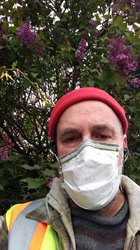
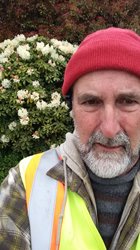
In June of 2018 I was diagnosed with lung cancer Stage 3C. My treatment began with chemo radiation. When that finished I started a new immuno-therapy - durvalumab. After nine months we saw progression so I began targeted therapy with Afatinib. Now that osimeritinib is funded I'm advocating all EGFR positive patients get it.
Isolation and hand washing come pretty naturally to a cancer patient who has lived through chemo. If anything, covid19 has pointed up the importance of strong relationships. I'm finding that sharing my experience is encouraging for many outside the cancer world. Writing has always been a wellspring of joy and energy for me. Keeping routine is one of my key coping mechanisms. Making sure that I sleep and eat well. Anchors, the parts of my week that let me know which day it is, give me both a strong sense of the passage of time but also of expectation - things to look forward to.
This to shall pass. But one of the important questions that I see people starting to reflect on is what will the new normal look like. We can make choices now that will determine what that future will look like. My conspiracy theory friends are making sure that we don't have unprecedented surveillance or rampant tyranny. But I'm wondering how many of us are discovering a new connection and longing for nature. Many are discovering a long lost love of creativity. So my question for you is what will this new world look like? What choices can we make now that will bring it fruition in our lives?
Heather and Bill Hogan
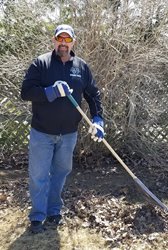 I was diagnosed with stage 3A non-small cell adenocarcinoma in September 2012. I was 52 and in the midst of a teaching career that I completely enjoyed. My lung cancer was an accidental finding thanks to an observant radiologist.
I was diagnosed with stage 3A non-small cell adenocarcinoma in September 2012. I was 52 and in the midst of a teaching career that I completely enjoyed. My lung cancer was an accidental finding thanks to an observant radiologist.
I completed my treatments in June 2013, almost 8 years ago and have had stable scans since then. For that I am truly grateful, however, I still worry about a reoccurrence and have tremendous anxiety before each scan.
During this time of COVID-19, I am well aware of the danger that is lurking if I leave my home. Knowing that this can attack my potentially weakened system and lungs is definitely frightening but that means I must ensure that I take all the precautions necessary to ensure my safety.
I believe, as cancer patients, our emotional well-being is equally as important as our physical well-being. What if your scans or treatments are delayed or surgery is postponed? Online oncology appointments are not the same as face to face meetings. Everything has changed and having a life-threatening disease certainly amplifies your circumstances.
As my husband and caregiver tells me, quite regularly, the only thing I can control is how I react to each day. I need to focus on the positives around me and limit the worrisome thoughts about lung cancer and COVID-19. How? Recognize that worrying is normal but when it happens, acknowledge it and then find something positive to occupy your mind. We all need hope. Hope that appointments and treatments will go forward. Hope that this virus doesn’t touch us. Hope that while they are doing all this research, they possibly find something that might work for our lung cancer and hope that spring and sunshine brightens our day.
I’m a crazy puzzle person. That is what I do when I want to distract my mind from all the noise and continuous newsfeeds. I keep in touch with my lung cancer social media groups. They understand. We all understand. When you can’t chat in person, there is always someone on line.
Don’t be afraid to reach out when you need it. Having lung cancer in the midst of this pandemic can be a huge load to carry but no one needs to do it alone. You are never alone.
To read Heather's full story click here